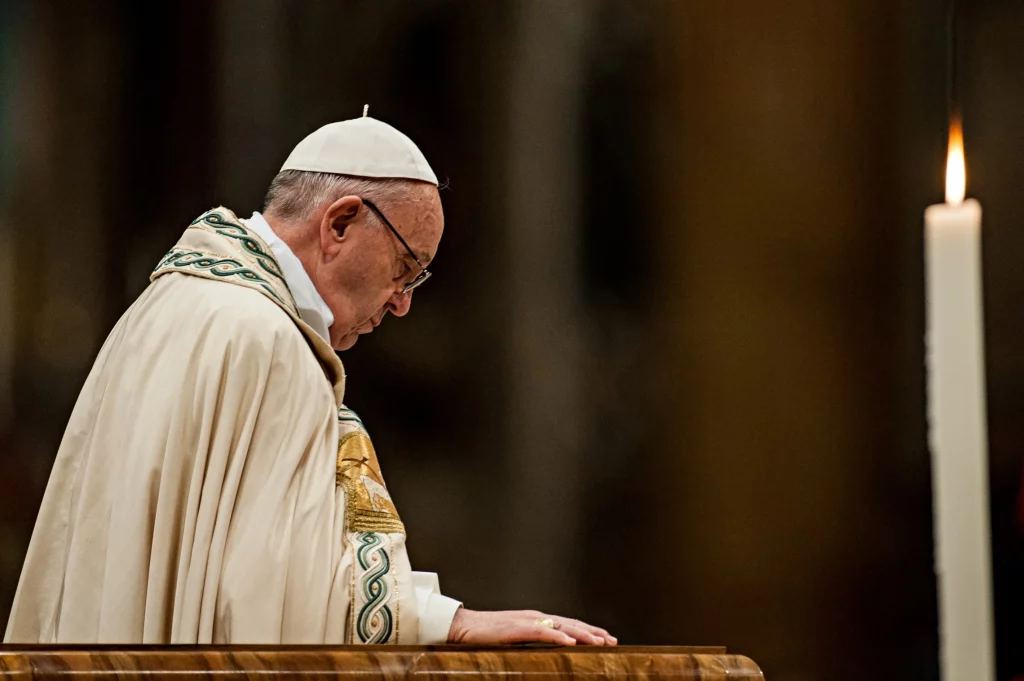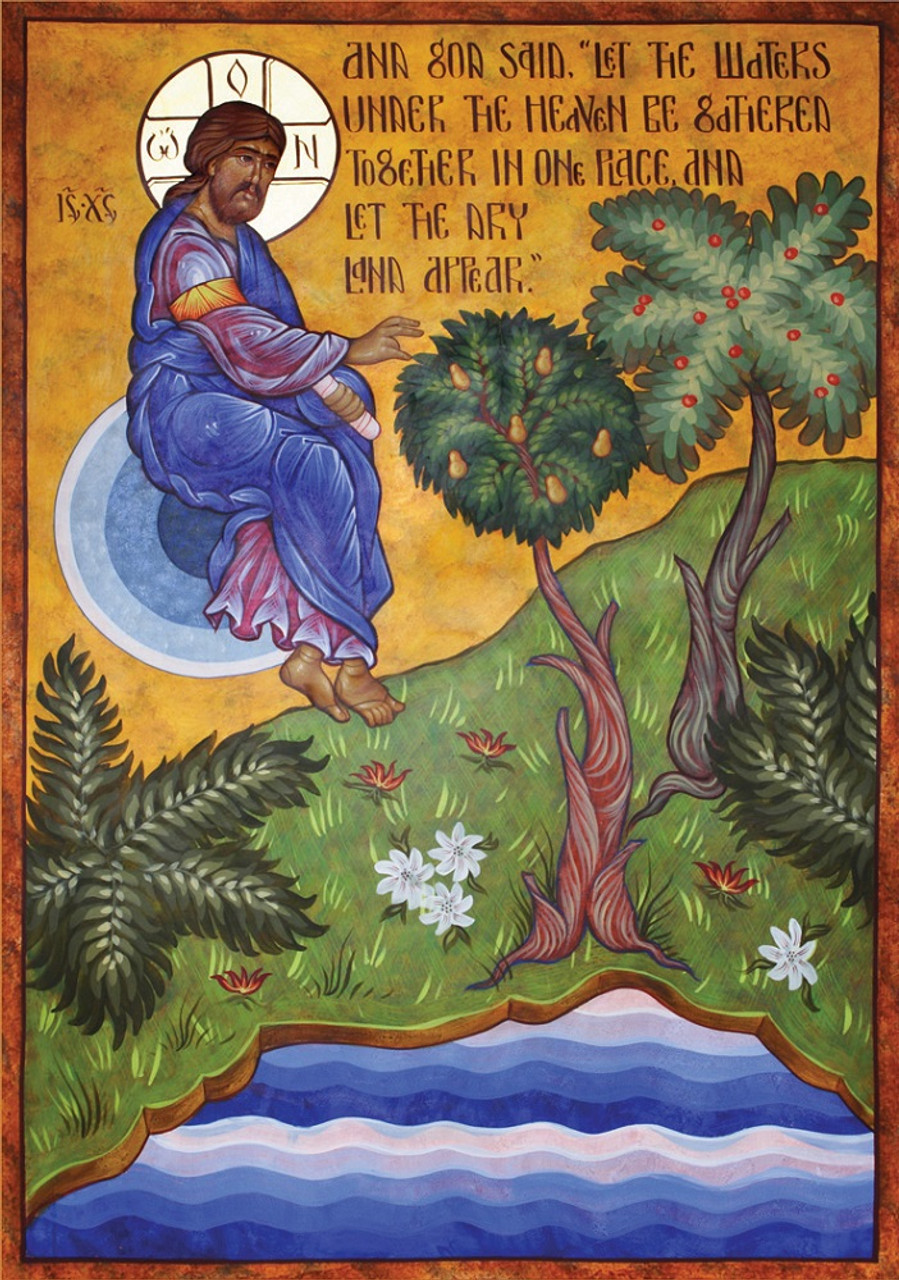by Vito Čapeta
Vito Čapeta is a master’s student in bioethics at Regina Apostolorum Pontifical Athenaeum. This essay was originally written in Italian but has been translated into English. The original Italian version is included at the bottom.
On the third day of Creation, God the Creator said: “Let the waters under the heavens be gathered together into one place, and let the dry land appear. And so it was so. God called the dry place “land” and the mass of waters “sea” and saw that it was good. On the fifth day God said: “Let the waters abound with living creatures, and let the winged creatures fly above the earth, in the wide space of heaven.” And God created the great sea monsters and all living creatures that move and abound in the waters according to their kind, and every winged creature according to its kind. And he saw that it was good. So he also created creeping, domestic and wild animals according to their kind on the sixth day. Finally, God said, “Let us make man in our image and after our likeness.” He created male and female.
Human existence is based on the three closely connected fundamental relationships: the relationship with God, with one’s neighbor, and with the earth. Man is called to subdue the earth (Gen 1:28) and to cultivate and guard it. Are we really doing this, or are we exploiting and neglecting it? Cultivating is a commandment from God. The harmony between the Creator, humanity, and all creation has been destroyed because we have claimed to take the place of God. It is idolatry of the self. Today there is much modern, dystopian, and deviant anthropocentrism without considering an ethics of responsibility, which is essential to Catholic ethics. On the one hand, absolute freedom is given to the human being (radical liberalism, relativism, pragmatism, will to power); whereby the act is good if it is freely done. If, for example, I throw rubbish in a forbidden place and do not protect the environment, what is the harm? It is enough to want freely. If the woman has an abortion freely, what is the harm? Freedom without responsibility. Rights without duties. Basically everything must be subject to the will of the individual.
On the other hand we have radical environmentalism in which man is totally subservient to the environment in which he lives. There is really an inversion in the order of creation. Today, people are concerned about protecting the environment and saving endangered animals, while propaganda is made to abort fetuses. Behind love for nature, behind love for the species, behind love for humanity lies hatred for mankind. Here is the inversion of values. Created things become more important than the Creator who created them. The environment becomes the most important.
We want to propose a biblical centrality of man. Now, the term environment means “that which surrounds.” This definition postulates the existence of a center around which environment exists. This center is the human being, the only creature in this world who is not only capable of self-awareness (image of God) and of his surroundings, but has the gift of intelligence to explore, to build, to develop, to create and to transform the environment in the human world. And he is ultimately responsible for the consequences and choices he makes. Thus, the specific difference that distinguishes man from all other living beings and the environment around him is interiority, language, education, technology and scientific knowledge, the development of religious and moral values, and contemplation.
It is important not to fall into extremism and one must have his eyes fixed on God the Creator and observe His commandments. One must have a healthy care for the environment and not neglect it. To succeed, one must focus not on nature in material terms, but on man and his vocation, and on God who wanted to associate man with his creation. Pope Francis has discussed how the Bible teaches that every human being is created out of love, made in the image and likeness of God (Gen 1:26). “This affirmation shows us the immense dignity of each human person, who is not just something, but someone…..What a wonderful certainty it is to know that the life of each person is not lost in a desperate chaos, in a world governed by pure chance or cycles that repeat without meaning! The Creator can say to each of us: ‘Before I formed you in the womb, I knew you. We were conceived in the heart of God and therefore each of us is the fruit of a thought of God. Each of us is wanted, each of us is loved, each of us is needed.”

Italian version
Nel terzo giorno della Creazione, Dio Padre Creatore disse: „Le acque sotto i cieli si raccolgano in un solo luogo e appaia asciutto“. E così avvenne. Dio chiamò l’asciutto “terra” e la massa delle acque “mare” e vide che era buono. Quinto giorno Dio disse: “Le acque abbondino delle creature viventi, e le creature alate volino sopra la terra, nell’ampio spazio del cielo.” E Dio creo i grandi mostri marini e tutte le creature viventi che si muovono e abbondano nelle acque secondo la loro specie e ogni creatura alata secondo la sua specie. E vide che era buono. Così creò anche animali striscianti, domestici e selvatici secondo la loro specie. Infine sesto giorno Dio disse: “Facciamo l’uomo a nostra immagine a nostra somiglianza.” Creò maschio e femmina.
L’esistenza umana si basa sulle tre relazioni fondamentali strettamente connesse: La relazione con Dio, con il prossimo e con la terra. Uomo viene chiamato di soggiogare la terra (Gen, 1,28) e di coltivarla e di custodirla. Lo stiamo davvero facendo, oppure lo stiamo sfruttando e trascurando? Coltivare è una indicazione da Dio. Queste relazioni sono rotte dal peccato: L’armonia tra il Creatore, l’umanità e tutto il creato è stata distrutta per avere noi preteso di prendere il posto di Dio. L’idolatria del proprio io. Oggi è molto presente antropocentrismo moderno, distopico e deviato senza prendere in considerazione una etica della responsabilità = etica cattolica. Da una parte si dà la libertà assoluta all’essere umano (liberalismo radicale, relativismo, pragmatismo, volontà di potenza); per cui l’atto è buono se è fatto liberamente, per cui se per esempio io butto la spazzatura in luogo vietato e non custodisco l’ambiente che male c’è? Basta volere liberamente. Se la donna ha fatto abortire liberamente che male c’è? Libertà senza responsabilità. Diritti senza doveri. Sostanzialmente tutto deve essere sottomesso alla volontà dell’individuo.
D’altra parte abbiamo ecologismo radicale. In cui uomo viene totalmente sottomesso all’ambiente in cui vive. C’è proprio una inversione nell’ordine della creazione. Oggi la gente è preoccupata della protezione dell’ambiente, delle città, della salvezza degli animali in via di estinzione, mentre si fa la propaganda di abortire i feti. Dietro dell’amore per la natura, dietro amore per la specie, dietro amore per la umanità si nasconde l’odio per uomo. Ecco la inversione dei valori. Più importanti diventano le cose create che il Creatore che li ha creato. Più importante diventa ambiente.
Noi vogliamo proporre una centralità biblica dell’uomo. Ora, il termine ambiente indica ciò che circonda. Questa definizione postula l’esistenza di un centro attorno al quale esiste ambiente. Questo centro è essere umano, unica creatura di questo mondo che non solo è in grado di avere coscienza di sé (immagine di Dio) e di quanto lo circonda, ma ha il dono dell’intelligenza di esplorare, di edificare, di sviluppare, di creare e di trasformare l’ambiente nel mondo umano. E in ultima analisi è responsabile delle conseguenze e di scelte che fa. Quindi la differenza specifica che distingue uomo da tutti gli altri esseri viventi e dall’ambiente che lo circonda è interiorità, il linguaggio, l’educazione, la tecnica e la conoscenza scientifica, lo sviluppo di valore religioso e morale, la contemplazione.
È importante non cadere negli estremismi e bisogna avere lo sguardo fisso in Dio Creatore e osservare i suoi comandamenti, altrettanto avere una sana cura dell’ambiente, curarlo e non di trascurarlo. Per riuscire a ottenere dei risultati bisogna concentrarsi non sulla natura materialmente intesa, ma sull’uomo e sulla sua vocazione, e su Dio che ha voluto associare l’uomo alla sua creazione. Dice papa Francesco: La Bibbia insegna che ogni essere umano è creato per amore, fatto ad immagine e somiglianza di Dio (Gen 1,26) “Questa affermazione ci mostra l’immensa dignità di ogni persona umana, che non è soltanto qualche cosa, ma qualcuno…..Che meravigliosa certezza è sapere che la vita di ogni persona non si perde in un disperato caos, in un mondo governato dalla pura casualità o da cicli che si ripetono senza senso! Il Creatore può dire a ciascuno di noi: “Prima di formarti nel grembo materno, ti ho conosciuto. Siamo stati concepiti nel cuore di Dio e quindi ciascuno di noi è il frutto di un pensiero di Dio. Ciascuno di noi è voluto, ciascuno è amato, ciascuno è necessario.”
